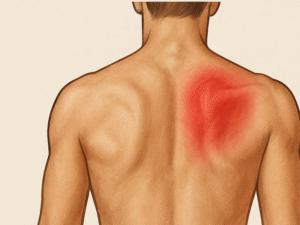Chronic Pain
Chronic pain is a complex health condition where pain lasts beyond normal healing time – typically 3+ months. Unlike acute pain that signals immediate injury, long-term chronic pain involves changes in the central nervous system (your brain and spinal cord). When pain becomes persistent, it evolves into a distinct pain disorder affecting many aspects of life.
Table of Contents
Common Types of Chronic Pain
Common types of chronic pain disorders include:
Chronic back pain (muscle or disc-related)
Nerve pain from damaged nerves
Arthritis-related joint inflammation
Spinal cord injury pain
Causes and Mechanisms
Causes of chronic pain vary: injuries, arthritis, or nerve pain from certain health conditions like diabetes. Chronic if it lasts beyond healing, the brain and spinal cord may amplify pain signals, causing persistent pain even without ongoing damage. Factors like stress make pain worse by sensitizing the central nervous system.
When Pain Becomes Unbearable
For people with chronic pain, severe flares can make pain unbearable. Symptoms like fatigue, sleep problems, and mood changes often accompany intense flares. When chronic pain becomes overwhelming:
Track your pain level objectively
Use prescribed pain relief techniques immediately
Contact your healthcare professional
Effective Pain Management Strategies
Managing chronic pain requires a comprehensive pain approach:
1. Medical Interventions
Over-the-counter NSAIDs for mild flares
Prescription pain medication for severe cases
Pain medicine targeting nerve pathways
Spinal cord stimulators for blocking pain signals
Specialized Therapies
Physical therapy to improve mobility
Cognitive behavioral therapy to reframe pain signals
Relaxation techniques (deep breathing, meditation)
Yoga or tai chi combining movement + relaxation
Building Your Management Plan
Work with a pain management specialist to:
Develop a plan to help control pain
Adjust pain medicine as needed
Address sleep problems exacerbating pain
Help you manage your pain holistically
When to Seek Immediate Help
Consult your healthcare professional when:
Pain flares increase in frequency
Pain affects daily functioning
Pain symptoms feel unmanageable
You need new pain management techniques
Lorem ipsum dolor sit amet, consectetur adipiscing elit. Ut elit tellus, luctus nec ullamcorper mattis, pulvinar dapibus leo.
Living Fully With Chronic Pain
While no universal cure for chronic pain exists, proper management helps:
Improve your quality of life
Regain control of your life
Enjoy life despite limitations
Find relief during severe flares
Final Considerations
Managing pain requires patience and adaptation. Key tips for living well include:
Follow advice from your doctor
Track patterns with a pain score system
Join support groups for people with chronic pain



